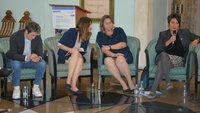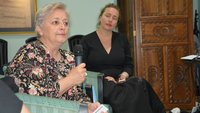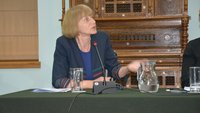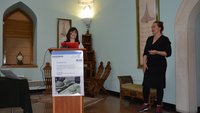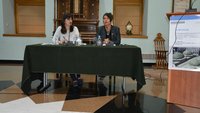Sarajevo: Children of War – Decades of Silence

The focus of the conference was on the children born out of the Bosnian war: those whose life began some 25 years ago as their mothers were raped. Who were the perpetrators? Enemy soldiers, blue berets, paramilitaries, members of hostile ethnic groups, former neighbours, staff of relief organisations, and many more. For decades nobody has spoken about these children or the human rights violations that their mothers had to suffer. Even though the same happens in almost any war. One thing is clear: neither the sexualised violence nor the silence about it happen by chance. In Bosnia-Herzegovina there were at least some women’s organisations, such as Medica Zenica and Vive Žene in Tuzla, who started to offer support for women and girls at an early stage.
It is time to talk about rape during war
In 2005, to mark the 60th anniversary of the end of World War II, medica mondiale launched a campaign and published a brochure entitled „Zeit zu sprechen“ (“Time to Talk”), aiming to draw public attention to the issue of sexualised wartime violence. What is needed to ensure this issue is spoken about? On the question of how long it will take before people are able to speak about sexualised wartime violence, an answer was offered by Heide Glaesmer, psychologist at the University of Leipzig: “That depends on historical and political conditions. It concerns guilt and it concerns trauma.” Sabine Lee, Professor in History at the University of Birmingham, added her observation that it only becomes possible to start a dialogue that breaks the silence when those affected find the strength to do so, and then only if society is ready and permits them to talk. In this regard, Esmina Avdibegovic, professor and doctor at the University of Tuzla, talks of a “Conspiracy of Silence”.
But how can the survivors find the strength they need for this if neither the government nor society recognise their suffering? Or if they are subject to society’s taboos? Or especially if they experience discrimination or ostracism because of the violence they suffered? Avdibegovic emphasised how important it was for Bosnia-Herzegovina that in the 1990s Monika Hauser raised donations to initiate integrated offers of support and also to conduct specific awareness-raising campaigns to counteract the stigmatisation. Founded 25 years ago, Medica Zenica was one of the first women’s rights organisations to take a stance against this silence, offer the women support and demand societal change.
What do decades of silence mean for the children born of war?
There is a further reason behind the stigmatisation that many women experience: their child, who was conceived during wartime rape. Cursed as “bastards” or “the enemy’s children”, these were and are stigmatised just like their mothers. Their suffering has been ignored, and the ‘disgrace’ is shifted from the perpetrator to the victim. At the same time, the consequences of the traumatic experience have an impact on the mother-child relationship: impaired bonding, violence and emotional negligence characterise their childhood unless the families receive some trauma-sensitive socio-psychological support. According to the research results presented by Amra Delic from the University of Greifswald, the physiological and psychological consequences for the children are very likely to be low self-esteem, feelings of anxiety, depression, inability to bond and nightmares.
Monika Hauser names the causes of these transgenerational impacts of traumatic experiences: “We can assume that the taboo against speaking about experiences of sexualised violence and this type of crime is one of the main reasons why the trauma passes from one generation to the next. So we also need to eliminate the causes of this taboo.” As Monika Hauser says, the issue at hand is for everyone to start talking about traumatic wartime experiences in general in order to understand and process their own war injuries. Only then will the specialist staff in the healthcare, legal or police sectors be able to truly adopt a trauma-sensitive approach when dealing with victims of sexualised wartime violence and their children. This approach is necessary to avoid the risk of (re-)traumatisation of the victims or themselves. This important insight is a result of the 25 years of practical experience at medica mondiale and Medica Zenica.
Strength and resilience in action for a non-violent future
Eliminating taboos, breaking through silence, and raising public awareness of the smouldering consequences of wartime violence are all declared aims of the newly founded organisation Forgotten Children of War. It was set up in 2015 by two people whose entire childhood and youth saw them stigmatised as children of war. They both have the strength necessary to battle injustices and taboos: Ajna Jusic and Alen Muhic. Ajna Jusic attended together with her mother Sabina Basic, who was one of the first clients at Medica Zenica. Back then, Monika Hauser had often rocked Ajna to sleep as she was a baby. In a closing talk with Ajna and Sabina it became especially clear how caring attention and support can help a strong resilience to develop even after very severe experiences. medica mondiale is very keen to raise donations enabling it to provide Forgotten Children of War with financial and expert assistance.
Background information on the conference
The organiser of the conference “A transgenerational perspective on conflict-related sexual violence – Facing the Past – Transforming the Future” was the academic federation CHIBOW (Children Born of War) in cooperation with the Universities of Leipzig and Greifswald. It took place in Sarajevo on May 14 and was attended by more than 100 people from science, government, women’s rights organisations and the media.
Related Topics
Video: TV Interview Monika Hauser about children conceived during wartime rape in Bosnia

